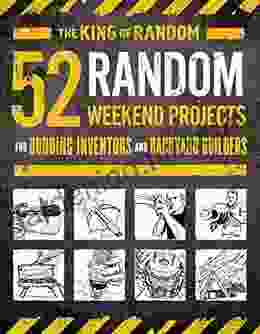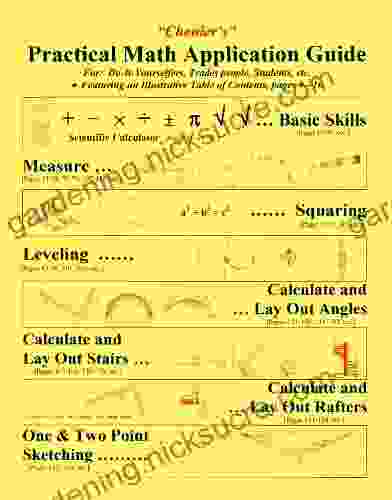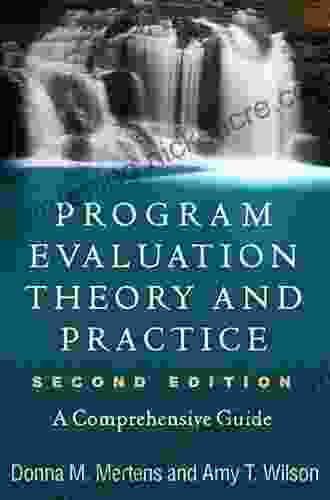Program Evaluation Theory and Practice: Second Edition

Comprehensive Guide to Evaluation Principles, Methods, and Techniques
Program evaluation is a systematic and objective process for assessing the impact of a program. It can be used to determine whether a program is achieving its goals, and to identify areas for improvement. Program evaluation theory and practice is a growing field, and there is a wealth of information available on the topic.
4.4 out of 5
| Language | : | English |
| File size | : | 8102 KB |
| Text-to-Speech | : | Enabled |
| Screen Reader | : | Supported |
| Enhanced typesetting | : | Enabled |
| Word Wise | : | Enabled |
| Print length | : | 620 pages |
This article provides a comprehensive overview of program evaluation theory and practice. It covers the following topics:
- What is program evaluation?
- Why is program evaluation important?
- Principles of program evaluation
- Methods of program evaluation
- Techniques of program evaluation
- Case studies in program evaluation
What is Program Evaluation?
Program evaluation is a systematic and objective process for assessing the impact of a program. It can be used to determine whether a program is achieving its goals, and to identify areas for improvement.
Program evaluation is often used to assess the following:
- Effectiveness: Is the program achieving its intended outcomes?
- Efficiency: Is the program being implemented in a cost-effective manner?
- Impact: What is the overall impact of the program on the community or population it serves?
Why is Program Evaluation Important?
Program evaluation is important for a number of reasons. First, it can help to ensure that programs are achieving their intended outcomes. Second, it can help to identify areas for improvement. Third, it can provide evidence to support funding decisions. Fourth, it can help to build public trust in programs.
Principles of Program Evaluation
There are a number of principles that guide program evaluation. These principles include:
- Objectivity: Program evaluations should be conducted in an objective and unbiased manner.
- Transparency: The methods and results of program evaluations should be transparent and publicly available.
- Relevance: Program evaluations should be relevant to the needs of the program and its stakeholders.
- Utility: Program evaluations should be useful for decision-making and program improvement.
Methods of Program Evaluation
There are a number of different methods that can be used to evaluate programs. These methods include:
- Experimental designs: Experimental designs are the most rigorous type of evaluation method. They involve randomly assigning participants to either a treatment group or a control group. The treatment group receives the program intervention, while the control group does not.
- Quasi-experimental designs: Quasi-experimental designs are less rigorous than experimental designs, but they can be used when it is not possible to randomly assign participants to a treatment group or a control group. Quasi-experimental designs use statistical methods to adjust for differences between the treatment group and the control group.
- Non-experimental designs: Non-experimental designs are the least rigorous type of evaluation method. They do not involve randomly assigning participants to a treatment group or a control group. Non-experimental designs rely on data from surveys, interviews, and observations.
Techniques of Program Evaluation
There are a number of different techniques that can be used to collect data for program evaluations. These techniques include:
- Surveys: Surveys are a common method for collecting data from a large number of people. Surveys can be administered online, by mail, or in person.
- Interviews: Interviews are a good way to collect in-depth data from a small number of people. Interviews can be conducted in person, by phone, or online.
- Observations: Observations are a good way to collect data on behavior. Observations can be conducted in person or by video.
- Document review: Document review
4.4 out of 5
| Language | : | English |
| File size | : | 8102 KB |
| Text-to-Speech | : | Enabled |
| Screen Reader | : | Supported |
| Enhanced typesetting | : | Enabled |
| Word Wise | : | Enabled |
| Print length | : | 620 pages |
Do you want to contribute by writing guest posts on this blog?
Please contact us and send us a resume of previous articles that you have written.
 Fiction
Fiction Non Fiction
Non Fiction Romance
Romance Mystery
Mystery Thriller
Thriller SciFi
SciFi Fantasy
Fantasy Horror
Horror Biography
Biography Selfhelp
Selfhelp Business
Business History
History Classics
Classics Poetry
Poetry Childrens
Childrens Young Adult
Young Adult Educational
Educational Cooking
Cooking Travel
Travel Lifestyle
Lifestyle Spirituality
Spirituality Health
Health Fitness
Fitness Technology
Technology Science
Science Arts
Arts Crafts
Crafts DIY
DIY Gardening
Gardening Petcare
Petcare Broccoli Lion
Broccoli Lion Sam Goulden
Sam Goulden Olszewski Marie Erin
Olszewski Marie Erin Nnedi Okorafor
Nnedi Okorafor Susan Walker
Susan Walker Yan Shen
Yan Shen Rick Gurnsey
Rick Gurnsey Bree Moore
Bree Moore Monte Burch
Monte Burch Jay Wilkinson
Jay Wilkinson Patrick Lange
Patrick Lange Bryan Smith
Bryan Smith Dr Katayune Kaeni
Dr Katayune Kaeni Ellen Sue Turner
Ellen Sue Turner Carol Stock Kranowitz
Carol Stock Kranowitz Amy Ogle
Amy Ogle Prerna Lal
Prerna Lal Whit Honea
Whit Honea Dinokids Press
Dinokids Press 50minutos Es
50minutos Es Marcia Verduin
Marcia Verduin Lucas Whitecotton
Lucas Whitecotton Mark V Wiley
Mark V Wiley William A Dembski
William A Dembski Kyla Stone
Kyla Stone John Gribbin
John Gribbin Allan Mundsack
Allan Mundsack Steve Garnett
Steve Garnett Barnett Rich
Barnett Rich Adam Silvera
Adam Silvera Joe Chilson
Joe Chilson Oscar Wegner
Oscar Wegner Mark Gregston
Mark Gregston Pat Dorsey
Pat Dorsey Jong Chul Ye
Jong Chul Ye Nathalie Dupree
Nathalie Dupree Tom Pyszczynski
Tom Pyszczynski Josh Elster
Josh Elster Fata Ariu Levi
Fata Ariu Levi Michaela Stith
Michaela Stith Karen Myers
Karen Myers Nate G Hilger
Nate G Hilger Aubrey Clayton
Aubrey Clayton John Kreiter
John Kreiter G I Gurdjieff
G I Gurdjieff Kate Usher
Kate Usher 4th Edition Kindle Edition With Audio Video
4th Edition Kindle Edition With Audio Video Iris Bohnet
Iris Bohnet Robert A Johnson
Robert A Johnson Deanne Howell
Deanne Howell James D Long
James D Long Louis Liebenberg
Louis Liebenberg Grant Thompson
Grant Thompson Bernard Cornwell
Bernard Cornwell Andre Norton
Andre Norton Meik Wiking
Meik Wiking L Madison
L Madison Charles Seife
Charles Seife Martha Menchaca
Martha Menchaca Emma Lord
Emma Lord Robert Pondiscio
Robert Pondiscio Christa Orecchio
Christa Orecchio Kenny Casanova
Kenny Casanova Dan Blackburn
Dan Blackburn Nathan Jendrick
Nathan Jendrick Brian Thompson
Brian Thompson Jamaica Stevens
Jamaica Stevens Mike Tyson
Mike Tyson Jason Curtis
Jason Curtis Elizabeth Wenk
Elizabeth Wenk Andrea Wulf
Andrea Wulf Terrence Real
Terrence Real 2nd Edition Kindle Edition
2nd Edition Kindle Edition Dominik Hartmann
Dominik Hartmann Barbara Klein
Barbara Klein John Iceland
John Iceland Shonna Slayton
Shonna Slayton Chris Dietzel
Chris Dietzel Robert Bauval
Robert Bauval Martin Mobraten
Martin Mobraten Jon Dunn
Jon Dunn Leonard Pellman
Leonard Pellman Aly Madhavji
Aly Madhavji Tony Hernandez Pumarejo
Tony Hernandez Pumarejo Carl J Sindermann
Carl J Sindermann Melissa Cheyney
Melissa Cheyney Marisha Pessl
Marisha Pessl John Hands
John Hands Sarah Templeton
Sarah Templeton Richard Adams
Richard Adams J D Salinger
J D Salinger Alice Ginott
Alice Ginott Lj Rivers
Lj Rivers Jay Cassell
Jay Cassell Pamela Adams
Pamela Adams Chase Williams
Chase Williams Naomi Scott
Naomi Scott Jenifer Fox
Jenifer Fox John Gookin
John Gookin Jessica Shortall
Jessica Shortall Patricia O Quinn
Patricia O Quinn Monica Sorrenson
Monica Sorrenson James Mcnicholas
James Mcnicholas Porter Fox
Porter Fox Jiichi Watanabe
Jiichi Watanabe Michael Geheran
Michael Geheran Robert Peter Gale
Robert Peter Gale Robert Mcentarffer
Robert Mcentarffer Roselyn Teukolsky
Roselyn Teukolsky Elaine Beaumont
Elaine Beaumont Paul Martin
Paul Martin Garrett Grolemund
Garrett Grolemund Manhattan Prep
Manhattan Prep Caroline Porter Thomas
Caroline Porter Thomas Kristine Setting Clark
Kristine Setting Clark Miranda Castro
Miranda Castro 5th Edition Kindle Edition
5th Edition Kindle Edition Sandra Mizumoto Posey
Sandra Mizumoto Posey Emma Dalton
Emma Dalton Andrew G Marshall
Andrew G Marshall Dan Falk
Dan Falk Howard Mudd
Howard Mudd Tom Mchale
Tom Mchale Alec Crawford
Alec Crawford Shelby Hailstone Law
Shelby Hailstone Law Joe Oliver
Joe Oliver Tyler Vanderweele
Tyler Vanderweele Russell Miller
Russell Miller Theris A Touhy
Theris A Touhy Patricia Stevens
Patricia Stevens Nancy Keene
Nancy Keene Heather Rain Mazen Korbmacher
Heather Rain Mazen Korbmacher Stephen P Anderson
Stephen P Anderson Heather Demetrios
Heather Demetrios Jeff Gill
Jeff Gill John Coleman
John Coleman Robert Ferguson
Robert Ferguson Joe Cuhaj
Joe Cuhaj Jamie Hand
Jamie Hand Thomas Wentworth Higginson
Thomas Wentworth Higginson Susan E Cayleff
Susan E Cayleff Starley Talbott
Starley Talbott 4th Edition Kindle Edition
4th Edition Kindle Edition Eli Boschetto
Eli Boschetto Janetti Marotta
Janetti Marotta Peter Wohlleben
Peter Wohlleben Gary S Thorpe
Gary S Thorpe Bookrags Com
Bookrags Com Max Domi
Max Domi Sam Irwin
Sam Irwin Theodore X O Connell
Theodore X O Connell Alessa Ellefson
Alessa Ellefson John A Yoegel
John A Yoegel Raymond Buckland
Raymond Buckland Raymond H Thompson
Raymond H Thompson Breanna Lam
Breanna Lam Jacquetta Hawkes
Jacquetta Hawkes George Pendle
George Pendle Jim Burns
Jim Burns Bertolt Brecht
Bertolt Brecht Roger Gordon
Roger Gordon Patricia Moore Pastides
Patricia Moore Pastides Riddleland
Riddleland Chris Froome
Chris Froome Linda A Roussel
Linda A Roussel Diane Duane
Diane Duane Don Fink
Don Fink Icon Digital Publishing
Icon Digital Publishing Dr Brenda Stratton
Dr Brenda Stratton John Collins
John Collins Kelly Slater
Kelly Slater Robert K Tyson
Robert K Tyson Micah Goodman
Micah Goodman Michael S Gazzaniga
Michael S Gazzaniga Leslie Leyland Fields
Leslie Leyland Fields Lars Behnke
Lars Behnke P G Maxwell Stuart
P G Maxwell Stuart Justin Hammond
Justin Hammond Syougo Kinugasa
Syougo Kinugasa Edyta Roszko
Edyta Roszko Gayle Jervis
Gayle Jervis Michael Alvear
Michael Alvear Liesbet Collaert
Liesbet Collaert Tom Lyons
Tom Lyons Brooklyn James
Brooklyn James Harry Middleton
Harry Middleton Edward Frenkel
Edward Frenkel 2012th Edition Kindle Edition
2012th Edition Kindle Edition Andrew Shapland
Andrew Shapland Miko Flohr
Miko Flohr Mohamed Elgendy
Mohamed Elgendy Greg Midland
Greg Midland Samantha Lovely
Samantha Lovely Justin Doyle
Justin Doyle Janet Sasson Edgette
Janet Sasson Edgette Geoffrey West
Geoffrey West Robert S Mueller
Robert S Mueller David Simkins
David Simkins Dan Wingreen
Dan Wingreen Michael W Ford
Michael W Ford Gregory J Privitera
Gregory J Privitera Simon G Thompson
Simon G Thompson Eric Dominy
Eric Dominy Laura Bright
Laura Bright Wong Kiew Kit
Wong Kiew Kit Geri Ann Galanti
Geri Ann Galanti Kekla Magoon
Kekla Magoon Jasmine Greene
Jasmine Greene Apsley Cherry Garrard
Apsley Cherry Garrard Louis Stanislaw
Louis Stanislaw L S Boos
L S Boos Chris Lehto
Chris Lehto Mitch Rubman
Mitch Rubman 1st English Ed Edition Kindle Edition
1st English Ed Edition Kindle Edition 2005th Edition Kindle Edition
2005th Edition Kindle Edition William Regal
William Regal Alan Jacobs
Alan Jacobs Patrick Viafore
Patrick Viafore Glenn N Levine
Glenn N Levine Lenora Ucko
Lenora Ucko Christy Jordan
Christy Jordan Paul Johnson
Paul Johnson 3rd Ed Edition Kindle Edition
3rd Ed Edition Kindle Edition Peter Dewhurst
Peter Dewhurst Kelly Skeen
Kelly Skeen Gershon Ben Keren
Gershon Ben Keren David Cheng
David Cheng Bernard Rosner
Bernard Rosner Robert Venditti
Robert Venditti Manuel De La Cruz
Manuel De La Cruz Elizabeth Bradfield
Elizabeth Bradfield Mark Brazil
Mark Brazil Suzie Cooney
Suzie Cooney Lois Duncan
Lois Duncan Natalie Smith
Natalie Smith Freda Mcmanus
Freda Mcmanus J Morgan Mcgrady
J Morgan Mcgrady Vibrant Publishers
Vibrant Publishers David Lloyd Kilmer
David Lloyd Kilmer Andrew Weber
Andrew Weber Lin Pardey
Lin Pardey Lewis Henry Morgan
Lewis Henry Morgan Skye Genaro
Skye Genaro Jacqueeia Ferguson
Jacqueeia Ferguson E Bruce Goldstein
E Bruce Goldstein Christoph Delp
Christoph Delp Theresa Cheung
Theresa Cheung Steve Kantner
Steve Kantner Bobby Blair
Bobby Blair Jillian Dodd
Jillian Dodd Greta Solomon
Greta Solomon Patricia S Potter Efron
Patricia S Potter Efron Deepak Chopra
Deepak Chopra Jordan Ifueko
Jordan Ifueko Chris Stewart
Chris Stewart Mimi Lemay
Mimi Lemay Brennan Barnard
Brennan Barnard Margaret Littman
Margaret Littman Steve Magness
Steve Magness Leonardo Trasande
Leonardo Trasande Peter Cossins
Peter Cossins Anthony Arvanitakis
Anthony Arvanitakis Herbert Feigl
Herbert Feigl Justin Bower
Justin Bower Dalai Lama
Dalai Lama Leon Anderson
Leon Anderson Sadie Radinsky
Sadie Radinsky Richard Bromfield
Richard Bromfield J Michael Leger
J Michael Leger 50minutes Com
50minutes Com Katie J Trent
Katie J Trent Jason Miller
Jason Miller Dr Danny Penman
Dr Danny Penman Temple Grandin
Temple Grandin Bonnie Scott
Bonnie Scott Katie M John
Katie M John Oliver Theobald
Oliver Theobald Leigh Calvez
Leigh Calvez Lareina Rule
Lareina Rule Keith Siragusa
Keith Siragusa A Digger Stolz
A Digger Stolz Laurie Forest
Laurie Forest Donna M Mertens
Donna M Mertens Sheryl Crow
Sheryl Crow 1st Ed 2016 Edition Kindle Edition
1st Ed 2016 Edition Kindle Edition David Kushner
David Kushner James Diego Vigil
James Diego Vigil Naomi Feil
Naomi Feil Robert Thurston
Robert Thurston Ellen Levitt
Ellen Levitt Joseph E Garland
Joseph E Garland Paul Deepan
Paul Deepan Elizabeth D Hutchison
Elizabeth D Hutchison A Christine Harris
A Christine Harris Nikki Grimes
Nikki Grimes Michael Romano
Michael Romano Cindy Kennedy
Cindy Kennedy Sherry Monahan
Sherry Monahan Subsequent Edition Kindle Edition
Subsequent Edition Kindle Edition Elizabeth Sims
Elizabeth Sims Nadav Snir
Nadav Snir Gregory Collins
Gregory Collins Rashad Jennings
Rashad Jennings Brian Kent
Brian Kent L Ulloque
L Ulloque Andrew Maraniss
Andrew Maraniss 8th Edition Kindle Edition
8th Edition Kindle Edition Gail Craswell
Gail Craswell Heather Job
Heather Job Lee Smolin
Lee Smolin Eloise Jarvis Mcgraw
Eloise Jarvis Mcgraw Bruno Latour
Bruno Latour Jeffrey A Greene
Jeffrey A Greene Kevin Paul
Kevin Paul Gianni La Forza
Gianni La Forza 3rd Edition Kindle Edition
3rd Edition Kindle Edition Gregory A Boyd
Gregory A Boyd Dustyn Roberts
Dustyn Roberts Dave Gerr
Dave Gerr Clint Malarchuk
Clint Malarchuk A C Grayling
A C Grayling Jozef Nauta
Jozef Nauta John Green
John Green Marty Bartholomew
Marty Bartholomew Diamond Wilson
Diamond Wilson Seymour Simon
Seymour Simon Richard Ania
Richard Ania 1st Edition Kindle Edition
1st Edition Kindle Edition A C Davison
A C Davison Edward Rosenfeld
Edward Rosenfeld Ulla Sarmiento
Ulla Sarmiento Andy Charalambous
Andy Charalambous Tony Horton
Tony Horton 6th Edition Kindle Edition
6th Edition Kindle Edition Gina Rae La Cerva
Gina Rae La Cerva Claudio De Castro
Claudio De Castro Maureen Johnson
Maureen Johnson Jasper Godwin Ridley
Jasper Godwin Ridley Dervla Murphy
Dervla Murphy Alden Jones
Alden Jones Juno Dawson
Juno Dawson George W E Nickelsburg
George W E Nickelsburg Terence Grieder
Terence Grieder Ernest Shackleton
Ernest Shackleton Evan Brashier
Evan Brashier Tami Lynn Kent
Tami Lynn Kent Sloane Mcclain
Sloane Mcclain Cassandra Johnson
Cassandra Johnson Mauricio Cabrini
Mauricio Cabrini Kerry Fraser
Kerry Fraser Eva Feder Kittay
Eva Feder Kittay Jonathan Ross
Jonathan Ross Debra Barnes
Debra Barnes Jo Frost
Jo Frost Al Ford
Al Ford Kristen Riecke
Kristen Riecke Ricki E Kantrowitz
Ricki E Kantrowitz Tasha Dunn
Tasha Dunn Collins Gcse
Collins Gcse Frank Sargeant
Frank Sargeant Jack M Bloom
Jack M Bloom Emily A Duncan
Emily A Duncan 7th Edition Kindle Edition
7th Edition Kindle Edition Eric I Karchmer
Eric I Karchmer Jd Brown
Jd Brown Nick Winkelman
Nick Winkelman Josh Mulvihill
Josh Mulvihill Bruce Watson
Bruce Watson Jean Clottes
Jean Clottes Justine Brooks Froelker
Justine Brooks Froelker Neal Bascomb
Neal Bascomb Christopher Lakeman
Christopher Lakeman Theodor W Adorno
Theodor W Adorno Kerri Maniscalco
Kerri Maniscalco Eric Haseltine
Eric Haseltine Jeremy Desilva
Jeremy Desilva Christopher Mcdougall
Christopher Mcdougall Michael Clarke
Michael Clarke Terence N D Altroy
Terence N D Altroy Patrick Hunt
Patrick Hunt Filipe Masetti Leite
Filipe Masetti Leite Ben Egginton
Ben Egginton Tok Hui Yeap Rd Csp Ld
Tok Hui Yeap Rd Csp Ld Lesli Richards
Lesli Richards Thomas R Baechle
Thomas R Baechle Andrew Collins
Andrew Collins Billie Jean King
Billie Jean King Rowan Ricardo Phillips
Rowan Ricardo Phillips Betty Crocker
Betty Crocker Bob Welch
Bob Welch Bill Reif
Bill Reif Cynthia Bourgeault
Cynthia Bourgeault Claire Sierra
Claire Sierra Debra Pascali Bonaro
Debra Pascali Bonaro Erika Bornman
Erika Bornman Kennedy Achille
Kennedy Achille Stefan Hofer
Stefan Hofer Mary H K Choi
Mary H K Choi Muata Ashby
Muata Ashby Karl Morris
Karl Morris Joseph Chilton Pearce
Joseph Chilton Pearce Amy Chua
Amy Chua Stewart Smith
Stewart Smith Rifujin Na Magonote
Rifujin Na Magonote Mark Hatmaker
Mark Hatmaker Buddy Martin
Buddy Martin Ziemowit Wojciechowski
Ziemowit Wojciechowski David Beaupre
David Beaupre Tracy Gharbo
Tracy Gharbo Hong Chen
Hong Chen Z Justin Ren
Z Justin Ren Marie Louise Von Franz
Marie Louise Von Franz Daphne Adler
Daphne Adler Patrick E Mcgovern
Patrick E Mcgovern Kristi K Hoffman
Kristi K Hoffman Natasha Preston
Natasha Preston A R Bernard
A R Bernard Brenda Dehaan
Brenda Dehaan Tim R Wolf
Tim R Wolf Kate Spencer
Kate Spencer Claire Baker
Claire Baker Steven D Levitt
Steven D Levitt Chris I Naylor
Chris I Naylor 006 Edition Kindle Edition
006 Edition Kindle Edition Mei Fong
Mei Fong Duy Tran
Duy Tran
Light bulbAdvertise smarter! Our strategic ad space ensures maximum exposure. Reserve your spot today!

 Ryūnosuke AkutagawaTherapeutic Modalities for Musculoskeletal Injuries: A Comprehensive Guide
Ryūnosuke AkutagawaTherapeutic Modalities for Musculoskeletal Injuries: A Comprehensive Guide Brian BellFollow ·5.1k
Brian BellFollow ·5.1k Jake CarterFollow ·4.9k
Jake CarterFollow ·4.9k Osamu DazaiFollow ·7.6k
Osamu DazaiFollow ·7.6k Michael SimmonsFollow ·10.4k
Michael SimmonsFollow ·10.4k Barry BryantFollow ·9.2k
Barry BryantFollow ·9.2k Roberto BolañoFollow ·15.8k
Roberto BolañoFollow ·15.8k Edward BellFollow ·16.5k
Edward BellFollow ·16.5k Jesus MitchellFollow ·13.3k
Jesus MitchellFollow ·13.3k

 Finn Cox
Finn CoxA Comprehensive Guide for Budding Inventors and Backyard...
For those with a restless mind and a...

 Forrest Reed
Forrest ReedThe Ultimate Shopper's Guide to Purchasing Weight Lifting...
Are you looking...

 Dillon Hayes
Dillon HayesThe Chemical Choir: Unveiling the Enchanting Symphony of...
In the enigmatic realm of science, where...

 Ryūnosuke Akutagawa
Ryūnosuke AkutagawaStumbling Thru: Hike Your Own Hike
In the realm of outdoor adventures,...

 Terry Pratchett
Terry PratchettUnlock Your Math Skills: A Comprehensive Guide to Chenier...
Math plays a vital role in...
4.4 out of 5
| Language | : | English |
| File size | : | 8102 KB |
| Text-to-Speech | : | Enabled |
| Screen Reader | : | Supported |
| Enhanced typesetting | : | Enabled |
| Word Wise | : | Enabled |
| Print length | : | 620 pages |












